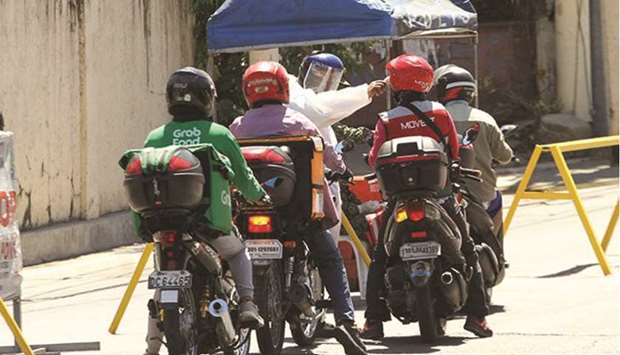The mayors of Quezon City and Valenzuela City said they were ready for a gradual reopening even as the public awaits a Palace decision to relax or extend the lockdown beyond the May 15 deadline.
Metro Manila, along with the rest of Luzon, has been under enhanced community quarantine (ECQ) since March 15, 2020. The deadline was extended before, supposedly ending next Friday, but a new online survey reported that 73% of respondents said they favoured another extension.
Palace spokesman Harry Roque Jr dismissed reports saying the ECQ has been extended as “fake news.”
He explained that the Inter-Agency Task Force for the Management of Emerging Infectious Diseases (IATF-EID) had yet to make a final recommendation to President Rodrigo Duterte about the quarantine.
He also raised the possibility that the enhanced quarantine could cover all areas or be “surgical,” meaning only the areas that still have a high number of coronavirus disease 2019 (Covid-19) would be kept under lockdown.
Earlier, the Metro Manila Council announced it would recommend another 15-day extension of the enhanced quarantine in Metro Manila.
The council, composed of 17 mayors in the National Capital Region or Metro Manila, wants to extend the enhanced quarantine until May 30 to allow their respective health departments to conduct mass testing.
Roque said the task force would consider the mayors’ recommendation, as they would be implementing the programme against Covid-19.
He added that the IATF-EID would reconvene on May 11 and submit its recommendation to President Duterte then.
The spokesman said he expected President Duterte to announce a decision today.
Quezon City for GCQ
A day after Metro Manila mayors proposed an extension of the enhanced quarantine, Quezon City announced it would implement a “transition period” to general community quarantine (GCQ) after May 15.
Mayor Josefina “Joy” Belmonte said in a statement, “While the health of our residents remains our primary priority, we also need to look after the local economy, which has been affected severely by the dreaded virus.”
She explained that the transitioning to a general quarantine would jump-start the local economy, adding that businesses would be required to adapt “strict health protocols” as a “new normal” setting.
“Necessary preventive measures should be in place and the health and safety of workers and customers must be guaranteed before we allow them to operate again,” she said.
Quezon City has the most cases of Covid-19, based on the Department of Health data. Even if Quezon City gets its way, businesses would be required to report their production capacities and commensurate workforce requirements.
“Penalties will be imposed on those who will fail to report,” Assistant City Administrator for Operations Alberto Kimpo said in the same statement.
Kimpo encouraged big businesses to have their staff tested for Covid-19 and to prepare quarantine facilities for them.
“Businesses must also implement mandatory temperature check at all entry points while dividers must be installed between work stations to prevent physical contact,” he said.
Kimpo added that no 24-hour operation would be allowed to give way to regular disinfection, except for medical related establishments.
The guidelines also require businesses a one-day closure for disinfection and sanitation, including an option to re-implement ECQ in villages or portions that are found to continue having high infection rates, subject to the approval of the task force unit in Metro Manila.
“Checkpoints will be retained and may be made stricter in priority areas, community testing will continue and contact tracing will be beefed up to help control the virus,” he said.
Also Mayor Rex Gatchalian of Valenzuela told Manila Times that his city was also ready for a downgrading to a GCQ, but added that he would respect the recommendation of the mayors’ council to again extend the enhanced quarantine.
He welcomed the statement of Interior and Local Government Secretary Eduardo Ano, who said that Valenzuela City and San Juan City could shift to a GCQ because they had the fewest Covid-19 cases in the metropolitan area.
Now that the government has the capability to conduct mass testing, some areas with fewer cases could be downgraded to a general quarantine.
“Let’s do it, Valenzuelanos. Stay home; there is discipline in Valenzuela. We are in the news for the right reasons,” Gatchalian said reacting to Ano’s statement. But Gatchalian admitted that it would be harder to contain the pandemic if the cities in Metro Manila were under different levels of quarantine.
“We know that the cities in Metro Manila are all interconnected while Valenzuela is the gateway to the north, which could be challenging if we are made to shift to GCQ because of the movement of the people that will come and go to the provinces and other cities and vice versa,” he said.
“But Valenzuela is ready to accept the challenge,” he added.
In a related development, PUBLiCUS Asia Inc. announced that it had conducted an online panel survey in Metro Manila, where 73% of the 1,000 respondents said they favoured extending the enhanced quarantine, while 27% were not in favour of that.

Motorcyclists are checked by police officers in the Cavite-NCR Border national capital region at the Marcos-Alvarez Road in Las Pinas City.
